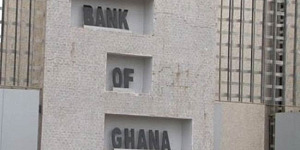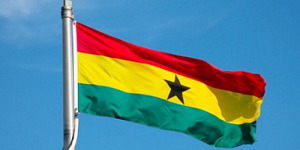On Oct. 23, 2015, Standard & Poor's Ratings Services affirmed its 'B-/B' long-and short-term foreign and local currency sovereign credit ratings on Ghana. The outlook is stable.
RATIONALE
The ratings reflect our view of Ghana's wide fiscal and external deficits, alongside other economic risks including double-digit inflation and the Ghanaian cedi's depreciation. The ratings also incorporate our assessment that Ghana is one of Africa's most established democracies, having introduced multiparty democracy 20 years ago, with both major political parties having taken a turn at relinquishing power after losing elections. The next parliamentary and presidential elections will take place at end-2016.
We forecast economic growth will slow in 2015 before picking up with increasing oil production in late 2016. The effect of harsher weather conditions earlier this year on agricultural production, namely the cocoa subsector, and persisting power and water shortages have added to the fallout from lower global gold and oil prices. We also expect that double-digit inflation and the cedi's depreciation will continue to weigh on consumer and business confidence and, consequently, investment. Nevertheless, domestic gas production, which has started this year, could eventually improve the stability and cost of the electricity supply. At the same time, we expect oil production will increase from late 2016 as the Tweneboa, Enyera, and Ntomme (TEN) oil fields come onstream. At the same time, Ghana’s oil production from existing oil fields could increase substantially in the next few years to nearly 200,000 barrel per day (b/d) by 2018, although legal challenges from the government of neighboring Cote d'Ivoire could create some uncertainty about oil production at the TEN oil fields.
Ghana posted a fiscal deficit of 9.3% of GDP in 2014. Falling oil revenues and slackening economic growth led the government to revise its 2015 deficit forecast to 7.3% of GDP for the year, compared with the 6.5% initially budgeted, but still below our expectation of 8.0%. Despite slower economic growth, however, fiscal consolidation is largely on track this year. Some fiscal revenues were higher than targeted during the first half of the year, stemming from additional tax measures under the IMF program, higher VAT on
imported goods, taxes on petroleum products and exports, and strong gains in corporate income tax receipts. Fiscal expenditures were slightly lower than budget forecasts, largely due to weaker growth in interest payments than anticipated, and lower social benefits and grants to government units.
We continue to believe that the new IMF program, approved on April 3, 2015, will help address fiscal and external imbalances, while projected increased oil production will likely support Ghana's economic growth prospects from late 2016 onward. The IMF's program for Ghana aims for fiscal consolidation via tax increases, revenue collection, and the elimination of tax loopholes on the revenue side, as well as strict expenditure control--especially on wages and subsidies. In addition, the program strives to eliminate potentially inflationary central bank financing of the fiscal deficit. We consider that delays in achieving the IMF program's objectives--including fiscal consolidation measures--for example due to unexpected spending in the run-up to the 2016 election--could take a toll on any additional financial assistance that Ghana gets from official lenders and hamper fiscal consolidation.
Ghana's debt ratios are currently at very high levels. Gross general government debt rose to 70% of GDP in 2014 from about 40% in 2011. In our base-case scenario, we now project general government debt will remain at that level in 2015-2018. We forecast general government interest expenditure will average about 33% of general government revenues in 2015-2018, far exceeding the 18% average in 2011-2014.
As of June 2015, 62% of government outstanding debt was denominated in foreign currency. As a result, the currency depreciation against the dollar during 2015 continued to exacerbate the negative pressure on government debt levels and servicing costs. By mid-2015, the local currency had further depreciated by about 30% against the U.S. dollar when compared to 2014. Any additional weakening of the currency over the medium term will exert even more pressure on the country’s debt stock and burden. Budget financing requirements were entirely covered by domestic debt issuance during the first half of 2015, including Treasury bill issuance (40% of the domestic debt program). During the same period, the Ghanaian banking system financed about 50% of the government's domestic borrowing requirements.
In October 2015, Ghana issued a 15-year $1 billion Eurobond, partly guaranteed by the International Development Association (IDA), at an annual coupon of 10.75%. In 2014, the government raised $1 billion from its 10-year Eurobond at a coupon of 8.125%. Ghana's external financing remains under pressure, in our view. The government's debt strategy suggests that it may rely more heavily on external financing to finance budget deficits over the medium term, which in our opinion would increase its debt portfolio's vulnerability to sharp movements in the foreign exchange rate and shifts in market sentiment. In a context of high domestic and possibly rising global interest rates, exchange rate risk, and the required elimination of monetary financing by the Bank of
Ghana from 2016 onward under the IMF program, the government faces challenging budget financing decisions, in our view.
Ghana stands to receive about US$300 million each year under the IMF program until 2018. We consider the IMF program and funding under the Extended Credit Facility to be a positive development for Ghana, potentially enhancing budgetary discipline and preventing pre-election spending. Moreover, earlier this year the Ghana Cocoa Board (Cocobod) signed its annual syndicated loan (US$1.8 billion), which it uses to purchase cocoa from farmers through licensed buying companies.
We anticipate that the IMF program will unlock additional assistance of about US$500 million in 2015 from other official lenders and donors such as the World Bank. Since the approval of the program this year, the European Union and the World Bank have disbursed, respectively, $180 million and $150 million, while the African Development Bank is shortly set to release $50 million. Additional disbursements from other official institutions will bring total official financing to close to $500 million, as expected, by year-end.
Other than official funding, Ghana's external financial account remains dependent on significant inflows of foreign direct investment, at about 5% of GDP on average over 2015-2017, and funding from international capital markets. Ghana's calling on the markets is, in our view, confidence sensitive and could be at risk if the government were unable to convince investors of its commitment to economic and fiscal reforms. Overall, we assess Ghana's external position as weak, with gross external financing needs (current account payments plus short-term external debt by remaining maturity) estimated at 127% of current account receipts and usable reserves in 2015, while usable
reserves will likely cover about two and a half months of current account payments. We anticipate that Ghana's current account deficit will narrow from 2017, as imports related to oil investments slow and oil exports rise. However, we project the current account deficit will remain relatively high, averaging about 8% of GDP in 2015-2018, compared with a deficit of 10% of GDP in 2011-2014.
The Bank of Ghana tightened its policy rate at its September 2015 meeting to 25%, bringing the cumulative hike for the year to 400 basis points. The latest policy rate increase came as inflation reached 17.3% year-on-year in August, compared with the central bank’s target band of 8% +/- 2%, owing primarily to the cedi's depreciation and cuts in fuel subsidies. The cedi floats, which helps the economy to adjust to movements in terms of trade and other external shocks, but the pass-through to inflation is high. The cedi remains highly volatile and has depreciated by about 18% against the U.S. dollar so far this year. We see the credibility of the Bank of Ghana's monetary policy as limited, with inflation averaging 13% per year during the past decade. In addition, the transmission of central bank monetary policy through Ghana's banks is muted, due to the low level of monetization and the Bank of Ghana's limited policy instruments.
OUTLOOK
The stable outlook reflects our view that wide fiscal and external accounts deficits will persist over the next year, while the IMF program will lead to gradual fiscal onsolidation and medium-term growth prospects will improve with increased oil and gas production.
We could lower the ratings if we conclude that Ghana's domestic or external debt financing conditions will likely worsen further, or if the Ghanaian authorities are unable to prevent further significant deterioration of the fiscal deficit or we observe a material reduction in international reserves. We could raise the ratings if Ghana's fiscal position improved sharply and net general government debt as a percentage of GDP contracted significantly, or external financing needs decreased markedly.





















































